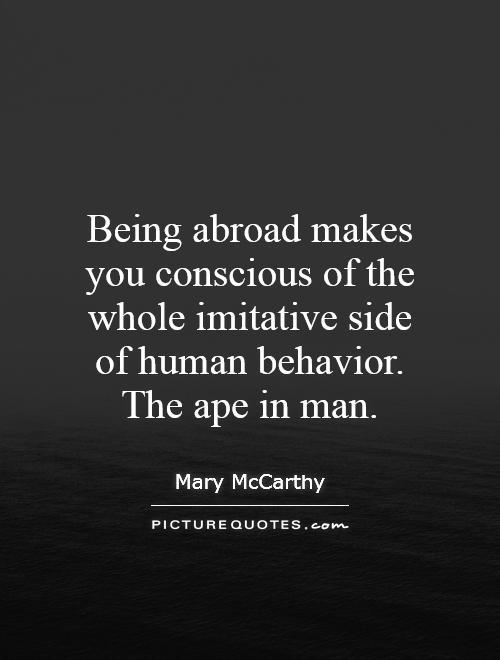Being abroad makes you conscious of the whole imitative side of human behavior. The ape in man

Being abroad makes you conscious of the whole imitative side of human behavior. The ape in man
Mary McCarthy, a renowned American writer and critic, once famously said, “Being abroad makes you conscious of the whole imitative side of human behavior. The ape in man.” This statement speaks to the idea that when we are in a foreign environment, we become more aware of how much we mimic and imitate the behaviors of those around us. It highlights the idea that human behavior is not always original or authentic, but rather a reflection of the influences and surroundings we find ourselves in.When we travel to a different country or culture, we are often confronted with new customs, traditions, and ways of interacting with others. In these unfamiliar settings, we may find ourselves unconsciously adopting the behaviors and mannerisms of the people around us in an effort to fit in or adapt to our new surroundings. This process of imitation can be both enlightening and unsettling, as it forces us to confront the ways in which our own behavior is shaped by external influences.
McCarthy’s observation also speaks to the idea that human behavior is not always driven by individuality or originality, but rather by a primal instinct to mimic and conform to the group. This idea of the “ape in man” suggests that beneath our veneer of civilization and sophistication, we are still fundamentally creatures of instinct and imitation. It reminds us that despite our best efforts to be unique and independent, we are still bound by the social and cultural norms that shape our behavior.












 Friendship Quotes
Friendship Quotes Love Quotes
Love Quotes Life Quotes
Life Quotes Funny Quotes
Funny Quotes Motivational Quotes
Motivational Quotes Inspirational Quotes
Inspirational Quotes